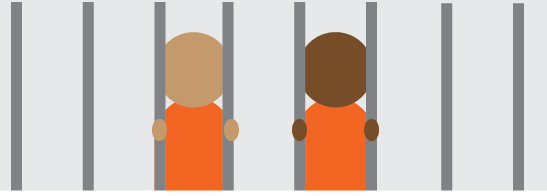[contact-form][contact-field label=”Name” type=”name” required=”true” /][contact-field label=”Email” type=”email” required=”true” /][contact-field label=”Website” type=”url” /][contact-field label=”Message” type=”textarea” /][/contact-form]
The right to vote is a fundamental aspect of any functional democracy. Everyone has the right to make their voices heard to cause change and make a difference in the direction a country takes.
Without the right to vote, the overall power of the people is weakened.
Unfortunately, there is a group of people in the United States who are barred from voting: convicted felons.
According to the National Conference of State Legislatures, “In 38 states and the District of Columbia, most ex-felons automatically gain the right to vote upon the completion of their sentence.”
Those 38 states and Washington, D.C. range from never taking away convicted felons’ right to vote, even in jail, to requiring felons to go through parole and probationary periods following their release.
However, in Alabama, Arizona, Delaware, Florida, Iowa, Kentucky, Mississippi, Nevada, Tennessee and Wyoming, felons may lose their right to vote permanently.
According to The Sentencing Project, “The United States remains one of the world’s strictest nations when it comes to denying the right to vote to citizens convicted of crimes. An estimated 6.1 million Americans are forbidden to vote because of ‘felony disenfranchisement,’ or laws restricting voting rights for those convicted of felony-level crimes.”
This disenfranchisement of felons creates a group of second-class citizens.
Convicted felons are punished for their crimes by being removed from society and put in prisons. However, the sentence often does not stop for felons after their time is served.
Felons struggle to find work when released from prison and can be effectively ostracized from society based on their past mistakes.
Prisons should be used as a means for reform rather than a means for revenge.
A stigma exists against former criminals in today’s society, one that greatly harms felons’ chances for successful reintegration into it, especially when felons are making an honest effort to better themselves.
According to Roy Speckhardt, executive director of the American Humanist Association, “[…] by assuming that a felon is unable to participate productively in society after completing their punishment, we send the message that those who have done wrong do not have the potential to improve.”
It is not okay that 6.1 million United States convicted felons are barred from participating in democratic processes. That figure amounts to 2.5 percent of the voting population.
Felons should have the right to participate in democracy in order to make their voices heard, just as anyone else does.
However, not all is lost. In Florida, where felons released from prison are barred from having their voting rights restored without direct approval from the governor, a grassroots campaign is underway to receive the required signatures for a ballot measure that would allow the people to vote on a constitutional amendment to give the right to vote back to felons.
Florida alone is home to 1.68 million of the 6.1 million felons without the right to vote.
While Florida does offer a clemency process, it can take many years and there’s no guarantee that the governor would grant back the right to vote.
According to Renato Sago, a writer for NPR, “Under Florida Gov. Rick Scott, 2,807 people have had their voting rights restored out of more than 29,611 cases the clemency board had reviewed as of Oct. 5.”
If the required 766,200 signatures required for putting constitutional amendments on the ballot are acquired and the ballot measure is approved, then all felons would regain their right to vote and the arduous clemency process would be done away with.
Furthermore, if the measure is successful, other states that bar felons from voting may take note and reassess their own laws.
Florida could potentially vote on the issue as soon as the 2018 midterms.
Felons are still human beings, despite the crimes they have committed. Everyone should have the chance to improve themselves by learning from their mistakes. Ostracizing felons does nothing but further harm and stigmatize them.
In order to have a well-functioning society and democracy, more must be done to ensure successful felon reintegration. Giving all felons the right to vote is the best first step to take.
Joshua Baldwin is a freshman computer science major from Greensboro, North Carolina.

